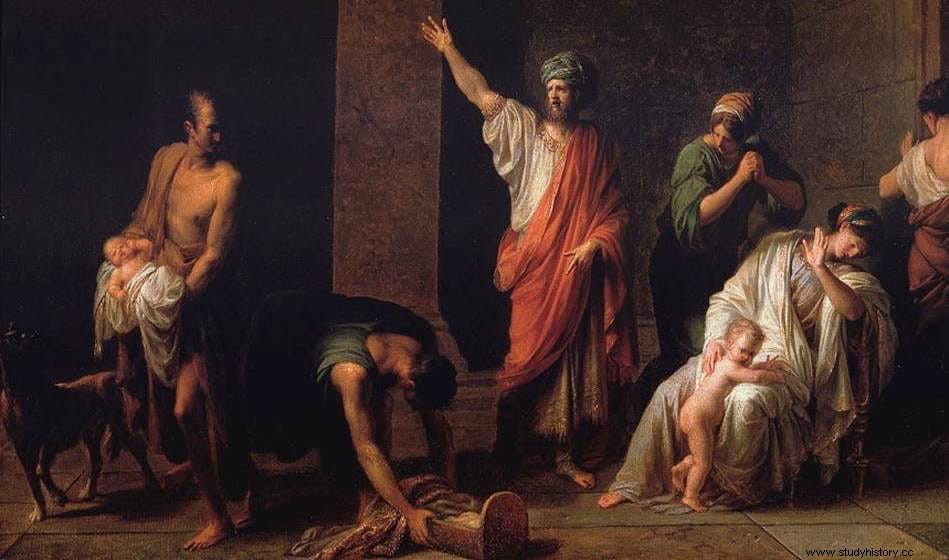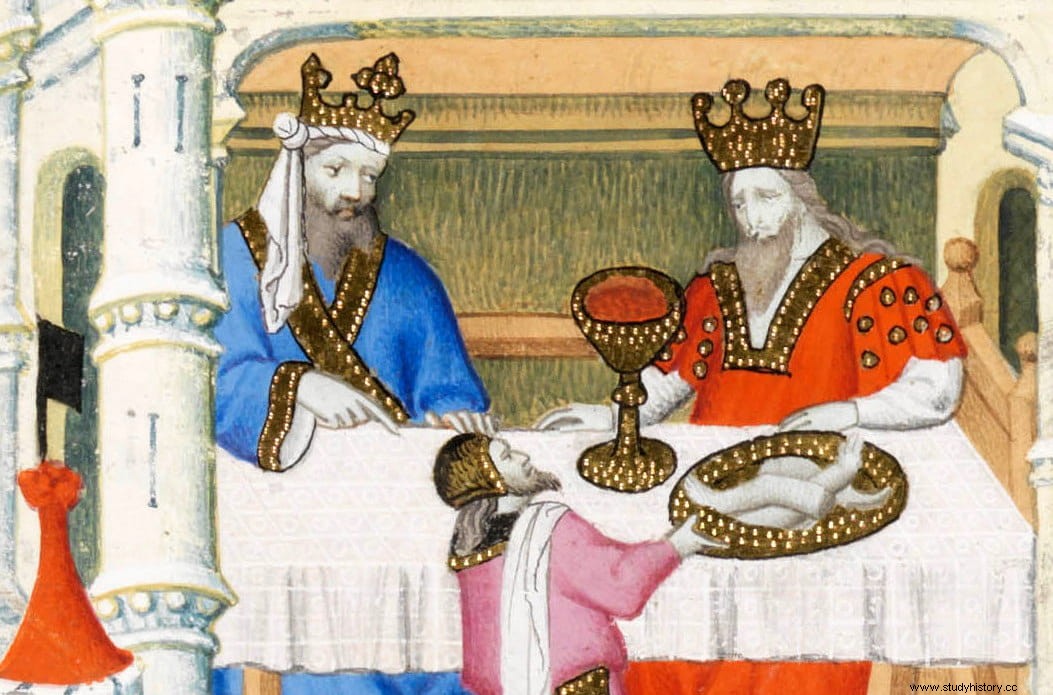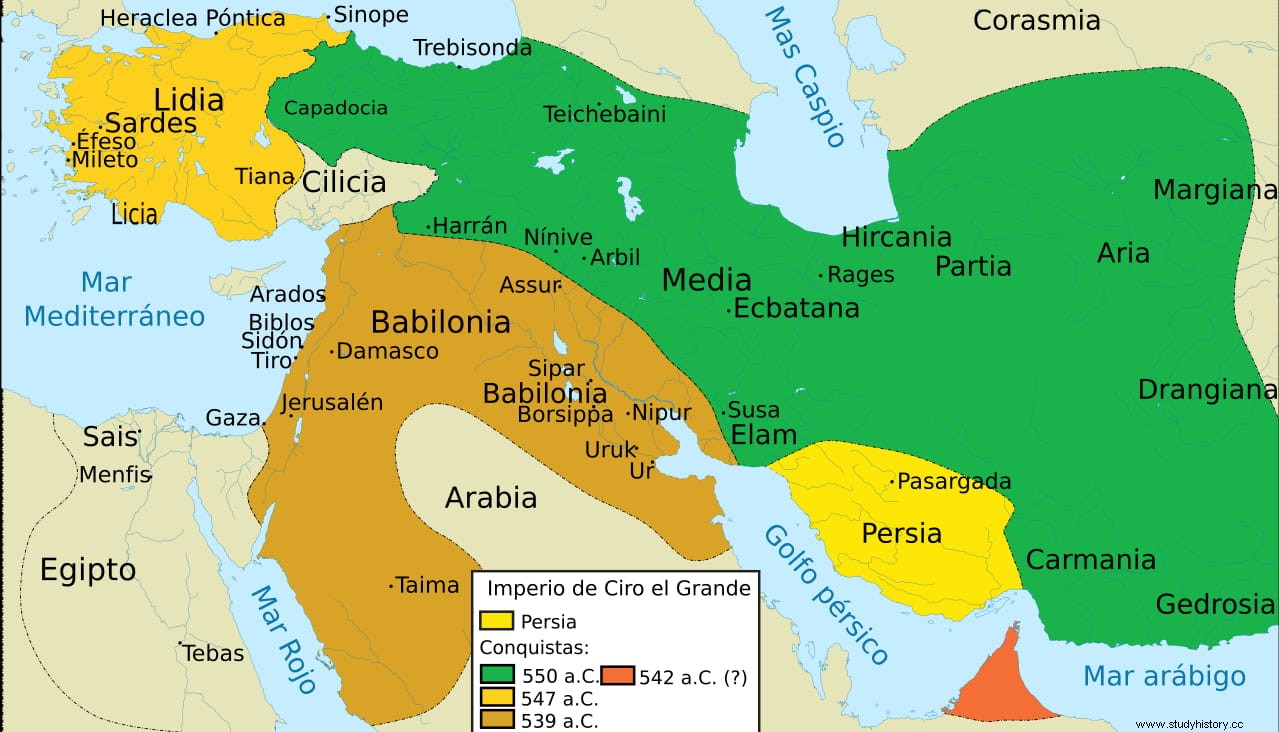One of the most repeated myths in Antiquity is that of the king whose end is prophesied at the hands of a descendant.
This leads the father to abandon him in the belief that he will die and, thus, he will be able to avoid the predicted destiny. Then it turns out that the boy is saved and fulfills his destiny. With more or less variants, we see it many times in classical mythology , as for example in the case of Jason and those of Romulus and Remus, or in the biblical , with Moses and Jesus himself, among others. Well, the Persians also have their version:that of Harpago , which also acquires even more tremendous tints.
The legend of Harpagus is told to us by Herodotus , although in reality he is a century later. We are located chronologically in the middle of the sixth century BC and geographically in Media , a territory that stretched from Cappadocia to the Arabian Sea, bordering Babylon to the south and the Caspian Sea to the north, with its capital in Ecbatana, although the borders changed according to the vicissitudes of the time.
Then reigned Astiages , son of the great Ciáxares, who had enlarged his empire at the expense of the Assyrians thanks to an alliance with the Babylonians of Nebuchadnezzar II, expanding his domain towards Anatolia. That was the legacy that Astyages inherited and that he could not maintain as such because of a prophetic dream that was fulfilled, despite the fact that he tried to avoid it expeditiously.

Astyages had a daughter named Mandana whom he gave in marriage to the Persian monarch Cambyses I , whose dynasty, the Achaemenid, ruled the region of Parsa. He was not a powerful sovereign but that is precisely why Astyages arranged with him to marry his daughter. The reason? The aforementioned dream, according to which he would be dethroned by his grandson ; To avoid this, instead of choosing a powerful Mede prince as his son-in-law, he opted for someone of lesser status whose offspring could never overshadow him. He was wrong because Mandana and Cambyses had a son they named Cyrus and that, as the canons command, he fulfilled his destiny.
There is another version of the myth according to which the bad dream omen of Astyages was later, when Cyrus was already born. In any case, the important thing is that the jealous monarch decided to kill him but since he feared he would end up cursed if he did it personally, he ordered a vassal to do the killing.
The appointee was a Median general named Harpago who, in turn, also did not want to stain his hands with innocent blood, so he delegated the task to Mithridates , a simple shepherd (another figure that is often repeated in mythology). Luckily for Ciro, this man had just lost his own offspring and decided to present his body as proof of the fulfillment of the mission, while secretly adopting the other. As the remains had been half devoured by the beasts of the forest, nobody noticed the deception.

Narrate Herodotus and the Nabonidus Chronicle that when Ciro turned ten, it was clear from his good looks that he couldn't just be a shepherd's son. So much so that Astyages himself became suspicious after meeting him personally. Questioned Harpago, he had to confess the truth; his sentence was terrible because the king forced him to eat his own son , which, of course, resulted in a deadly hatred towards his lord.
Before long he would have the opportunity to take revenge; It was only a matter of waiting for Ciro to grow up, since the young man had been returned to his parents to keep him away from court. This episode of cannibalism will sound familiar to more than one because once again we find a version in Greek mythology:the one in which the king of Mycenae, Atreus , organized a feast for his brother Thyestes in which what he really wanted was to avenge his wife's infidelity with him; At that banquet, the main dish that he had served were his nephews.
Sure enough, when Cyrus became an adult he was persuaded by Harpagus to lead an insurrection that he was organizing throughout Media against his despotic grandfather. It is said that, to avoid surveillance, the communication between the two had to be through a message hidden in the entrails of a hare. The grandson led a coalition of Persian tribes and prepared to face the army of Astyages, who in his naivete had made Harpago general.
Actually, it seems that it was Astyages who started a campaign against the Persians. In any case, the two sides clashed at the Battle of Pasargada , which was not such because the Medes troops, following instructions from his superior, went over to the enemy. Thus, all together, they marched on Ecbatana to dethrone Astyages.
Although he was taken prisoner -and, according to most sources, well treated by Cyrus to unite the Medes and Persians-, they still had to face their Lydian allies . They defeated them in two battles, Pteria and Timbrea, stopping the expansionist desires of their king Creso , which he took advantage of to fish in troubled waters also obeying, curiously, a prophecy of the Oracle of Delphi :if he crossed the river Halis it would cause the fall of an empire.

The omen did not fail to predict him although, as often happened, it depended on interpretation:Croesus, with his attempted annexation of Media, produced the fall of an empire , indeed, but yours; some sources place him as killed in combat and others as a prisoner in the Persian court.
These events have a historical background but, obviously, their packaging is legendary, surely for propaganda reasons . And it is that with the triumph of Ciro, that he would become known by the nickname of el Grande , the Persian Empire was founded , raising the Achaemenid dynasty to a power that until then had not even dreamed of and that made sure to spread the word that Mandana's mother was of Lydian origin.
Therefore, his son Cyrus also had the right to the throne of Lydia and justified the annexation to which it was subjected progressively since then, first by the satrap Tabalo and later, when the ancient kingdom of Croesus rebelled, prolonging the conflict for four years, by soldiers such as Mazares or even Harpagus himself, who became famous for his left hand as satrap and for introducing novel war techniques (earth ramps, soldiers specialized in climbing walls or the most famous, which gave Ciro victory in Pteria, of placing camels in the front line to scare away the enemy cavalry with their scent).
